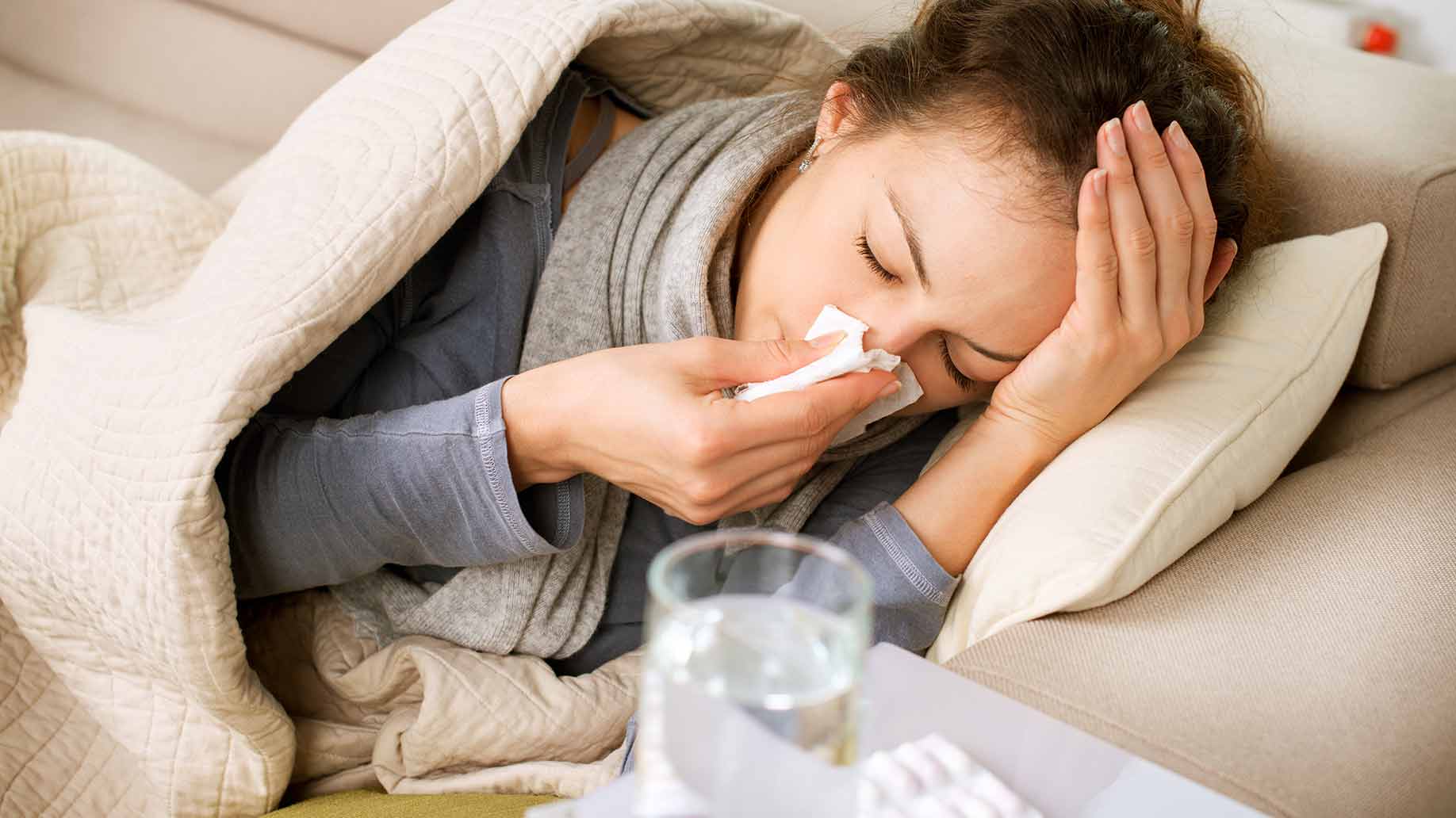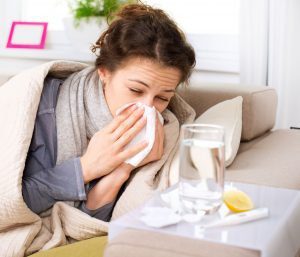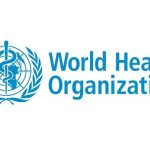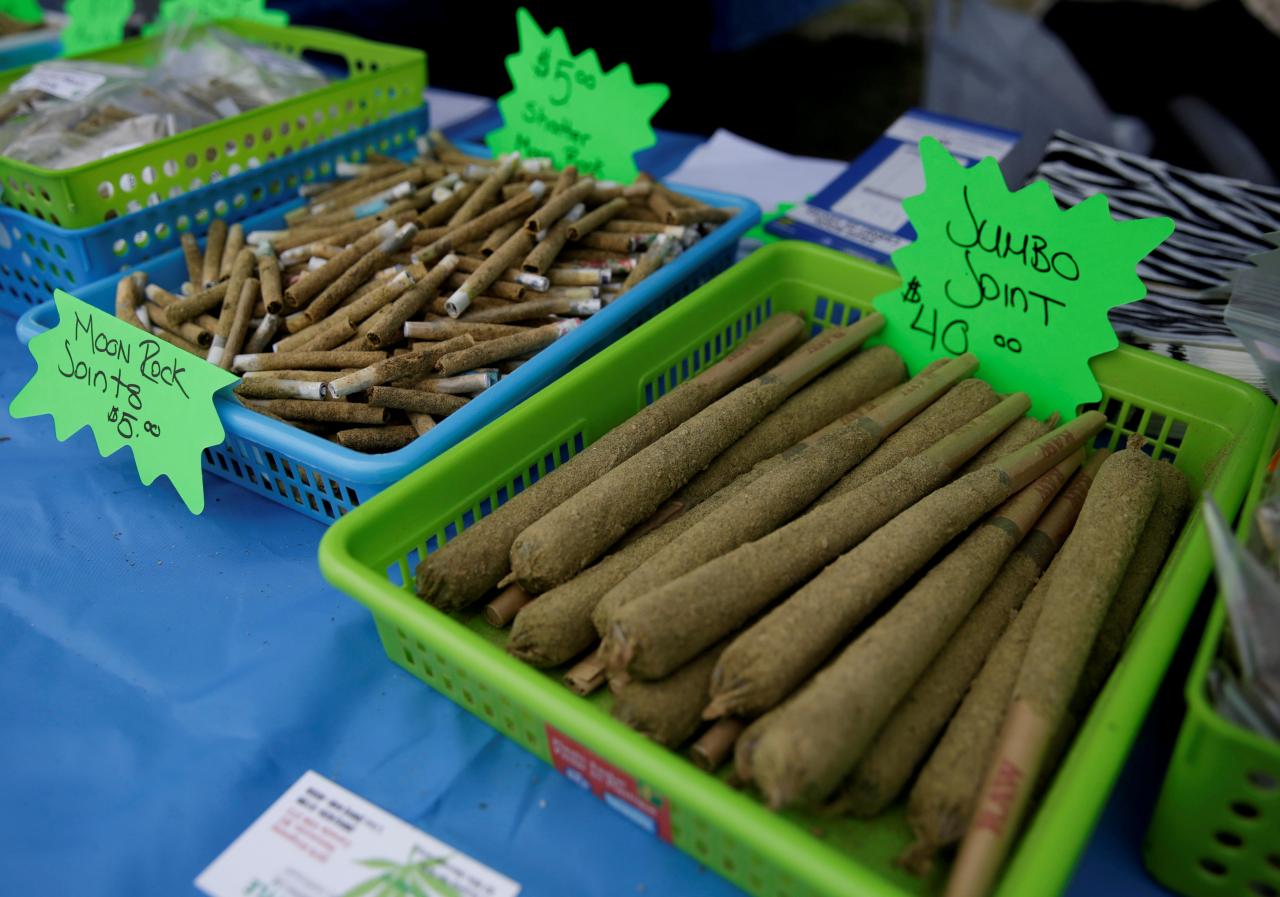Washing of hands regularly – No matter what line of work you’re in, if you come in contact with people who are contagious, you have to wash your hands over and over, says Alan Pocinki, MD. Pocinki practices internal medicine at the George Washington University Hospital in Washington, DC.
“Wash your hands as much as you can stand, and then some more — especially after wrapping up a visit with someone who’s sick,” Pocinki says.
It sounds so simple, but soap and water are the constant companions of doctors and nurses. To completely get rid of viruses from your skin, you need to scrub hard for 20 seconds or more. A good way to time yourself is to sing “Happy Birthday” twice while scrubbing the backs of your hands, between your fingers, and under your nails. It doesn’t matter if the water’s hot or cold — the very act of scrubbing will physically remove the germs.
Use alcohol-based hand sanitizer – If you can’t get to soap and water, sanitizer can kill cold and flu germs.
Avoid getting close to people who are sick – Avoid shake of hands with sick people,“Doctors tend to be very cautious about hand shaking,” says Terri Remy, MD, medical director of Medical Associates at Beauregard in Alexandria, VA. “Just explain, ‘To keep transmission of colds and flu down, I’m not shaking hands. But hello! Nice to meet you!’ They understand.”
Keep your surroundings clean. Arlington, VA, massage therapist Amanda Long asks clients to stay home if they feel bad. But to be safe, she sanitizes doorknobs and light switches between sessions. It’s a practice she swears by.
Beth Geoghegan, a paramedic in South Florida, says she starts her day by cleaning her work space with virus-and-germ-killing soaps.
“It may sound like overkill, but it’s not — it’s awareness,” she says. “It’s a matter of looking at your environment and thinking, ‘What could be contaminated?’ All it takes is a tiny droplet. What could have a droplet on it? And I know someone was in my ambulance for 12 hours before I got there — both patients and other paramedics. It may already look clean, but it might not be.”
It’s also a matter of context. When Geoghegan gets home from a shift where nothing much happened, she launches into her normal activities. If it’s been a day filled with sick patients, she follows a different routine.
“If I saw 10 patients today, and eight had flu symptoms, I’m likely to take my uniform off the minute I get home, put it in the wash, and get right in the shower. Because you just never know,” she says.
Keep up a healthy lifestyle. It’s important to look after your own health, says Ardis Dee Hoven, MD, an internal medicine and infectious disease specialist in Lexington, KY.
“Do all the things we all should be doing on a daily basis anyway,” Hoven says. “Get adequate rest — which people underestimate — get good nutrition, don’t smoke, and keep your allergies controlled, because if they’re out of control, then your upper respiratory tree is already inflamed, which sets it up to more easily acquire a virus.
Washing of hands regularly – No matter what line of work you’re in, if you come in contact with people who are contagious, you have to wash your hands over and over, says Alan Pocinki, MD. Pocinki practices internal medicine at the George Washington University Hospital in Washington, DC.
“Wash your hands as much as you can stand, and then some more — especially after wrapping up a visit with someone who’s sick,” Pocinki says.
It sounds so simple, but soap and water are the constant companions of doctors and nurses. To completely get rid of viruses from your skin, you need to scrub hard for 20 seconds or more. A good way to time yourself is to sing “Happy Birthday” twice while scrubbing the backs of your hands, between your fingers, and under your nails. It doesn’t matter if the water’s hot or cold — the very act of scrubbing will physically remove the germs.
Use alcohol-based hand sanitizer – If you can’t get to soap and water, sanitizer can kill cold and flu germs.
Avoid getting close to people who are sick – Avoid shake of hands with sick people,“Doctors tend to be very cautious about hand shaking,” says Terri Remy, MD, medical director of Medical Associates at Beauregard in Alexandria, VA. “Just explain, ‘To keep transmission of colds and flu down, I’m not shaking hands. But hello! Nice to meet you!’ They understand.”
Keep your surroundings clean. Arlington, VA, massage therapist Amanda Long asks clients to stay home if they feel bad. But to be safe, she sanitizes doorknobs and light switches between sessions. It’s a practice she swears by.
Beth Geoghegan, a paramedic in South Florida, says she starts her day by cleaning her work space with virus-and-germ-killing soaps.
“It may sound like overkill, but it’s not — it’s awareness,” she says. “It’s a matter of looking at your environment and thinking, ‘What could be contaminated?’ All it takes is a tiny droplet. What could have a droplet on it? And I know someone was in my ambulance for 12 hours before I got there — both patients and other paramedics. It may already look clean, but it might not be.”
It’s also a matter of context. When Geoghegan gets home from a shift where nothing much happened, she launches into her normal activities. If it’s been a day filled with sick patients, she follows a different routine.
“If I saw 10 patients today, and eight had flu symptoms, I’m likely to take my uniform off the minute I get home, put it in the wash, and get right in the shower. Because you just never know,” she says.
Keep up a healthy lifestyle. It’s important to look after your own health, says Ardis Dee Hoven, MD, an internal medicine and infectious disease specialist in Lexington, KY.
“Do all the things we all should be doing on a daily basis anyway,” Hoven says. “Get adequate rest — which people underestimate — get good nutrition, don’t smoke, and keep your allergies controlled, because if they’re out of control, then your upper respiratory tree is already inflamed, which sets it up to more easily acquire a virus.
Washing of hands regularly – No matter what line of work you’re in, if you come in contact with people who are contagious, you have to wash your hands over and over, says Alan Pocinki, MD. Pocinki practices internal medicine at the George Washington University Hospital in Washington, DC.
“Wash your hands as much as you can stand, and then some more — especially after wrapping up a visit with someone who’s sick,” Pocinki says.
It sounds so simple, but soap and water are the constant companions of doctors and nurses. To completely get rid of viruses from your skin, you need to scrub hard for 20 seconds or more. A good way to time yourself is to sing “Happy Birthday” twice while scrubbing the backs of your hands, between your fingers, and under your nails. It doesn’t matter if the water’s hot or cold — the very act of scrubbing will physically remove the germs.
Use alcohol-based hand sanitizer – If you can’t get to soap and water, sanitizer can kill cold and flu germs.
Avoid getting close to people who are sick – Avoid shake of hands with sick people,“Doctors tend to be very cautious about hand shaking,” says Terri Remy, MD, medical director of Medical Associates at Beauregard in Alexandria, VA. “Just explain, ‘To keep transmission of colds and flu down, I’m not shaking hands. But hello! Nice to meet you!’ They understand.”
Keep your surroundings clean. Arlington, VA, massage therapist Amanda Long asks clients to stay home if they feel bad. But to be safe, she sanitizes doorknobs and light switches between sessions. It’s a practice she swears by.
Beth Geoghegan, a paramedic in South Florida, says she starts her day by cleaning her work space with virus-and-germ-killing soaps.
“It may sound like overkill, but it’s not — it’s awareness,” she says. “It’s a matter of looking at your environment and thinking, ‘What could be contaminated?’ All it takes is a tiny droplet. What could have a droplet on it? And I know someone was in my ambulance for 12 hours before I got there — both patients and other paramedics. It may already look clean, but it might not be.”
It’s also a matter of context. When Geoghegan gets home from a shift where nothing much happened, she launches into her normal activities. If it’s been a day filled with sick patients, she follows a different routine.
“If I saw 10 patients today, and eight had flu symptoms, I’m likely to take my uniform off the minute I get home, put it in the wash, and get right in the shower. Because you just never know,” she says.
Keep up a healthy lifestyle. It’s important to look after your own health, says Ardis Dee Hoven, MD, an internal medicine and infectious disease specialist in Lexington, KY.
“Do all the things we all should be doing on a daily basis anyway,” Hoven says. “Get adequate rest — which people underestimate — get good nutrition, don’t smoke, and keep your allergies controlled, because if they’re out of control, then your upper respiratory tree is already inflamed, which sets it up to more easily acquire a virus.
Washing of hands regularly – No matter what line of work you’re in, if you come in contact with people who are contagious, you have to wash your hands over and over, says Alan Pocinki, MD. Pocinki practices internal medicine at the George Washington University Hospital in Washington, DC.
“Wash your hands as much as you can stand, and then some more — especially after wrapping up a visit with someone who’s sick,” Pocinki says.
It sounds so simple, but soap and water are the constant companions of doctors and nurses. To completely get rid of viruses from your skin, you need to scrub hard for 20 seconds or more. A good way to time yourself is to sing “Happy Birthday” twice while scrubbing the backs of your hands, between your fingers, and under your nails. It doesn’t matter if the water’s hot or cold — the very act of scrubbing will physically remove the germs.
Use alcohol-based hand sanitizer – If you can’t get to soap and water, sanitizer can kill cold and flu germs.
Avoid getting close to people who are sick – Avoid shake of hands with sick people,“Doctors tend to be very cautious about hand shaking,” says Terri Remy, MD, medical director of Medical Associates at Beauregard in Alexandria, VA. “Just explain, ‘To keep transmission of colds and flu down, I’m not shaking hands. But hello! Nice to meet you!’ They understand.”
Keep your surroundings clean. Arlington, VA, massage therapist Amanda Long asks clients to stay home if they feel bad. But to be safe, she sanitizes doorknobs and light switches between sessions. It’s a practice she swears by.
Beth Geoghegan, a paramedic in South Florida, says she starts her day by cleaning her work space with virus-and-germ-killing soaps.
“It may sound like overkill, but it’s not — it’s awareness,” she says. “It’s a matter of looking at your environment and thinking, ‘What could be contaminated?’ All it takes is a tiny droplet. What could have a droplet on it? And I know someone was in my ambulance for 12 hours before I got there — both patients and other paramedics. It may already look clean, but it might not be.”
It’s also a matter of context. When Geoghegan gets home from a shift where nothing much happened, she launches into her normal activities. If it’s been a day filled with sick patients, she follows a different routine.
“If I saw 10 patients today, and eight had flu symptoms, I’m likely to take my uniform off the minute I get home, put it in the wash, and get right in the shower. Because you just never know,” she says.
Keep up a healthy lifestyle. It’s important to look after your own health, says Ardis Dee Hoven, MD, an internal medicine and infectious disease specialist in Lexington, KY.
“Do all the things we all should be doing on a daily basis anyway,” Hoven says. “Get adequate rest — which people underestimate — get good nutrition, don’t smoke, and keep your allergies controlled, because if they’re out of control, then your upper respiratory tree is already inflamed, which sets it up to more easily acquire a virus.
Washing of hands regularly – No matter what line of work you’re in, if you come in contact with people who are contagious, you have to wash your hands over and over, says Alan Pocinki, MD. Pocinki practices internal medicine at the George Washington University Hospital in Washington, DC.
“Wash your hands as much as you can stand, and then some more — especially after wrapping up a visit with someone who’s sick,” Pocinki says.
It sounds so simple, but soap and water are the constant companions of doctors and nurses. To completely get rid of viruses from your skin, you need to scrub hard for 20 seconds or more. A good way to time yourself is to sing “Happy Birthday” twice while scrubbing the backs of your hands, between your fingers, and under your nails. It doesn’t matter if the water’s hot or cold — the very act of scrubbing will physically remove the germs.
Use alcohol-based hand sanitizer – If you can’t get to soap and water, sanitizer can kill cold and flu germs.
Avoid getting close to people who are sick – Avoid shake of hands with sick people,“Doctors tend to be very cautious about hand shaking,” says Terri Remy, MD, medical director of Medical Associates at Beauregard in Alexandria, VA. “Just explain, ‘To keep transmission of colds and flu down, I’m not shaking hands. But hello! Nice to meet you!’ They understand.”
Keep your surroundings clean. Arlington, VA, massage therapist Amanda Long asks clients to stay home if they feel bad. But to be safe, she sanitizes doorknobs and light switches between sessions. It’s a practice she swears by.
Beth Geoghegan, a paramedic in South Florida, says she starts her day by cleaning her work space with virus-and-germ-killing soaps.
“It may sound like overkill, but it’s not — it’s awareness,” she says. “It’s a matter of looking at your environment and thinking, ‘What could be contaminated?’ All it takes is a tiny droplet. What could have a droplet on it? And I know someone was in my ambulance for 12 hours before I got there — both patients and other paramedics. It may already look clean, but it might not be.”
It’s also a matter of context. When Geoghegan gets home from a shift where nothing much happened, she launches into her normal activities. If it’s been a day filled with sick patients, she follows a different routine.
“If I saw 10 patients today, and eight had flu symptoms, I’m likely to take my uniform off the minute I get home, put it in the wash, and get right in the shower. Because you just never know,” she says.
Keep up a healthy lifestyle. It’s important to look after your own health, says Ardis Dee Hoven, MD, an internal medicine and infectious disease specialist in Lexington, KY.
“Do all the things we all should be doing on a daily basis anyway,” Hoven says. “Get adequate rest — which people underestimate — get good nutrition, don’t smoke, and keep your allergies controlled, because if they’re out of control, then your upper respiratory tree is already inflamed, which sets it up to more easily acquire a virus.
Washing of hands regularly – No matter what line of work you’re in, if you come in contact with people who are contagious, you have to wash your hands over and over, says Alan Pocinki, MD. Pocinki practices internal medicine at the George Washington University Hospital in Washington, DC.
“Wash your hands as much as you can stand, and then some more — especially after wrapping up a visit with someone who’s sick,” Pocinki says.
It sounds so simple, but soap and water are the constant companions of doctors and nurses. To completely get rid of viruses from your skin, you need to scrub hard for 20 seconds or more. A good way to time yourself is to sing “Happy Birthday” twice while scrubbing the backs of your hands, between your fingers, and under your nails. It doesn’t matter if the water’s hot or cold — the very act of scrubbing will physically remove the germs.
Use alcohol-based hand sanitizer – If you can’t get to soap and water, sanitizer can kill cold and flu germs.
Avoid getting close to people who are sick – Avoid shake of hands with sick people,“Doctors tend to be very cautious about hand shaking,” says Terri Remy, MD, medical director of Medical Associates at Beauregard in Alexandria, VA. “Just explain, ‘To keep transmission of colds and flu down, I’m not shaking hands. But hello! Nice to meet you!’ They understand.”
Keep your surroundings clean. Arlington, VA, massage therapist Amanda Long asks clients to stay home if they feel bad. But to be safe, she sanitizes doorknobs and light switches between sessions. It’s a practice she swears by.
Beth Geoghegan, a paramedic in South Florida, says she starts her day by cleaning her work space with virus-and-germ-killing soaps.
“It may sound like overkill, but it’s not — it’s awareness,” she says. “It’s a matter of looking at your environment and thinking, ‘What could be contaminated?’ All it takes is a tiny droplet. What could have a droplet on it? And I know someone was in my ambulance for 12 hours before I got there — both patients and other paramedics. It may already look clean, but it might not be.”
It’s also a matter of context. When Geoghegan gets home from a shift where nothing much happened, she launches into her normal activities. If it’s been a day filled with sick patients, she follows a different routine.
“If I saw 10 patients today, and eight had flu symptoms, I’m likely to take my uniform off the minute I get home, put it in the wash, and get right in the shower. Because you just never know,” she says.
Keep up a healthy lifestyle. It’s important to look after your own health, says Ardis Dee Hoven, MD, an internal medicine and infectious disease specialist in Lexington, KY.
“Do all the things we all should be doing on a daily basis anyway,” Hoven says. “Get adequate rest — which people underestimate — get good nutrition, don’t smoke, and keep your allergies controlled, because if they’re out of control, then your upper respiratory tree is already inflamed, which sets it up to more easily acquire a virus.
Washing of hands regularly – No matter what line of work you’re in, if you come in contact with people who are contagious, you have to wash your hands over and over, says Alan Pocinki, MD. Pocinki practices internal medicine at the George Washington University Hospital in Washington, DC.
“Wash your hands as much as you can stand, and then some more — especially after wrapping up a visit with someone who’s sick,” Pocinki says.
It sounds so simple, but soap and water are the constant companions of doctors and nurses. To completely get rid of viruses from your skin, you need to scrub hard for 20 seconds or more. A good way to time yourself is to sing “Happy Birthday” twice while scrubbing the backs of your hands, between your fingers, and under your nails. It doesn’t matter if the water’s hot or cold — the very act of scrubbing will physically remove the germs.
Use alcohol-based hand sanitizer – If you can’t get to soap and water, sanitizer can kill cold and flu germs.
Avoid getting close to people who are sick – Avoid shake of hands with sick people,“Doctors tend to be very cautious about hand shaking,” says Terri Remy, MD, medical director of Medical Associates at Beauregard in Alexandria, VA. “Just explain, ‘To keep transmission of colds and flu down, I’m not shaking hands. But hello! Nice to meet you!’ They understand.”
Keep your surroundings clean. Arlington, VA, massage therapist Amanda Long asks clients to stay home if they feel bad. But to be safe, she sanitizes doorknobs and light switches between sessions. It’s a practice she swears by.
Beth Geoghegan, a paramedic in South Florida, says she starts her day by cleaning her work space with virus-and-germ-killing soaps.
“It may sound like overkill, but it’s not — it’s awareness,” she says. “It’s a matter of looking at your environment and thinking, ‘What could be contaminated?’ All it takes is a tiny droplet. What could have a droplet on it? And I know someone was in my ambulance for 12 hours before I got there — both patients and other paramedics. It may already look clean, but it might not be.”
It’s also a matter of context. When Geoghegan gets home from a shift where nothing much happened, she launches into her normal activities. If it’s been a day filled with sick patients, she follows a different routine.
“If I saw 10 patients today, and eight had flu symptoms, I’m likely to take my uniform off the minute I get home, put it in the wash, and get right in the shower. Because you just never know,” she says.
Keep up a healthy lifestyle. It’s important to look after your own health, says Ardis Dee Hoven, MD, an internal medicine and infectious disease specialist in Lexington, KY.
“Do all the things we all should be doing on a daily basis anyway,” Hoven says. “Get adequate rest — which people underestimate — get good nutrition, don’t smoke, and keep your allergies controlled, because if they’re out of control, then your upper respiratory tree is already inflamed, which sets it up to more easily acquire a virus.
Washing of hands regularly – No matter what line of work you’re in, if you come in contact with people who are contagious, you have to wash your hands over and over, says Alan Pocinki, MD. Pocinki practices internal medicine at the George Washington University Hospital in Washington, DC.
“Wash your hands as much as you can stand, and then some more — especially after wrapping up a visit with someone who’s sick,” Pocinki says.
It sounds so simple, but soap and water are the constant companions of doctors and nurses. To completely get rid of viruses from your skin, you need to scrub hard for 20 seconds or more. A good way to time yourself is to sing “Happy Birthday” twice while scrubbing the backs of your hands, between your fingers, and under your nails. It doesn’t matter if the water’s hot or cold — the very act of scrubbing will physically remove the germs.
Use alcohol-based hand sanitizer – If you can’t get to soap and water, sanitizer can kill cold and flu germs.
Avoid getting close to people who are sick – Avoid shake of hands with sick people,“Doctors tend to be very cautious about hand shaking,” says Terri Remy, MD, medical director of Medical Associates at Beauregard in Alexandria, VA. “Just explain, ‘To keep transmission of colds and flu down, I’m not shaking hands. But hello! Nice to meet you!’ They understand.”
Keep your surroundings clean. Arlington, VA, massage therapist Amanda Long asks clients to stay home if they feel bad. But to be safe, she sanitizes doorknobs and light switches between sessions. It’s a practice she swears by.
Beth Geoghegan, a paramedic in South Florida, says she starts her day by cleaning her work space with virus-and-germ-killing soaps.
“It may sound like overkill, but it’s not — it’s awareness,” she says. “It’s a matter of looking at your environment and thinking, ‘What could be contaminated?’ All it takes is a tiny droplet. What could have a droplet on it? And I know someone was in my ambulance for 12 hours before I got there — both patients and other paramedics. It may already look clean, but it might not be.”
It’s also a matter of context. When Geoghegan gets home from a shift where nothing much happened, she launches into her normal activities. If it’s been a day filled with sick patients, she follows a different routine.
“If I saw 10 patients today, and eight had flu symptoms, I’m likely to take my uniform off the minute I get home, put it in the wash, and get right in the shower. Because you just never know,” she says.
Keep up a healthy lifestyle. It’s important to look after your own health, says Ardis Dee Hoven, MD, an internal medicine and infectious disease specialist in Lexington, KY.
“Do all the things we all should be doing on a daily basis anyway,” Hoven says. “Get adequate rest — which people underestimate — get good nutrition, don’t smoke, and keep your allergies controlled, because if they’re out of control, then your upper respiratory tree is already inflamed, which sets it up to more easily acquire a virus.


 Cold as well as flu can be referred to as heart breaking illness, here is a good news for people who are exposed to cold and flu germs. Doctors, urge attendants, teachers, parents as well as guardians, to know a thing or two about how to stay healthy when everyone around them is sick.
Cold as well as flu can be referred to as heart breaking illness, here is a good news for people who are exposed to cold and flu germs. Doctors, urge attendants, teachers, parents as well as guardians, to know a thing or two about how to stay healthy when everyone around them is sick.











